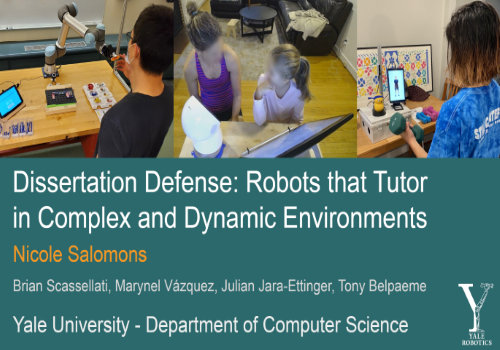
July 7, 2022
Lab member Nicole Salomons defended her dissertation “Robots that Tutor in Complex and Dynamic Environments“ today. Nicole is joining Imperial College London as a Lecturer (equivalent to Assistant Professor) as part of the of the Imperial-X initiative.
Abstract:
Robots have shown great promise in being effective tutors for both children and adults. They have been shown to be successful in a variety of domains, including math tutoring for children, interruptions training for adults with Autism Spectrum Disorder, and assisting the elderly while exercising. Despite the great potential of tutoring robots, most studies have focused on providing short-term tutoring either in a laboratory or a school while the researcher is present. For robots to be more broadly successful, users need to be able to practice skills on a more prolonged basis. This requires robotic systems to tutor in unstructured settings, such as in homes and schools. Furthermore, robots need to autonomously model the user and provide personalized help without needing a researcher’s presence.
In this dissertation, we investigate several aspects of how to create robots that can autonomously tutor in complex and dynamic environments. Our work starts by expanding the types of tasks that robots can train. Current robotic systems mainly focus on simple tasks. We present two algorithms that allow robots to tutor more complex tasks: C-BKT and BKT-POMDP. C-BKT enables a system to model a user’s skills over time, providing opportunities for a robot to offer earlier personalized help actions compared to prior solutions. BKT-POMDP provides a policy for which task to give users to test their skills and which task should be chosen to maximize teaching when there are multiple skills per task. Throughout the dissertation, we provide examples of how we modeled complex tasks, including electronic circuits, social skills, and exercise forms.
In sequence, we investigate which robot characteristics allow for successful tutoring. We explore how the role of a robot influences the interaction when tutoring adults. We compare a robot that takes on the role of a peer to taking on the role of a traditional instructor. Our work provides evidence that a peer robot increases learning for a subset of the population and that it is generally viewed more favorably than an instructor robot. We also investigated how robots indirectly influence those around them by showing that robots can cause conformity. People are willing to rely on information provided by robots when they are unsure of the answer themselves. We also show that robots cause peer pressure on participants.
Finally, we demonstrate two long-term systems where peer robots operated autonomously in participants’ homes. We show that robots successfully tutored and influenced participants in their homes while maintaining engagement. In the first system, a robot provided adults with motivation and coaching while doing dumbbell exercises. We show that an embodied robot is more effective than the same robot shown in a video on a tablet screen. In the second system, we built a robotic system that provided dyadic tutoring to children with Autism Spectrum Disorder and their caregivers. The robot engaged the user in social skills training via interactive games. Our clinical measures show that the robot increased children’s social skills during the 30-day robotic intervention.
Advisor: Brian Scassellati
Other committee members:
Marynel Vázquez
Julian Jara-Ettinger
Tony Belpaeme (Ghent University)